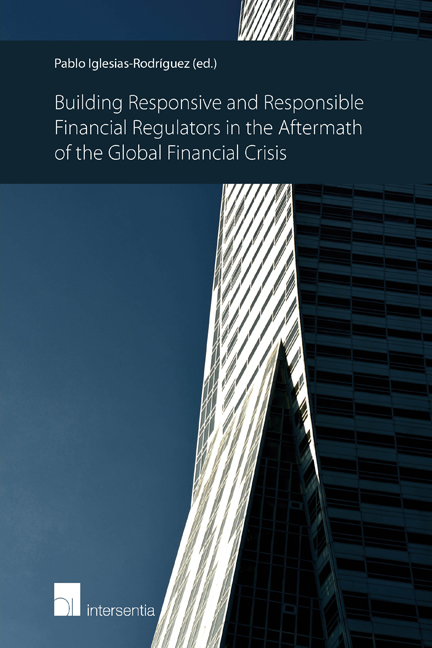Book contents
- Frontmatter
- Preface and acknowledgements
- Foreword
- Contents
- List of contributors
- Responsive-and-responsible financial regulation in the aftermath of the global financial crisis
- Part I THE CONTRIBUTION OF ACCOUNTABILITY, INDEPENDENCE AND ECONOMIC THEORY TO RESPONSIVE-AND-RESPONSIBLE FINANCIAL REGULATION
- Financial institutions and accountability mechanisms
- Central bank governance, society and politicians: the tale of independence
- The ultrarational illusion of finance. Economics and policymaking
- Part II POST-CRISIS ARCHITECTURES OF FINANCIAL REGULATION IN THE EUROPEAN UNION, THE UNITED STATES OF AMERICA AND CANADA: ACCOUNTABILITY AND RESPONSIVENESSAND- RESPONSIBILITY
- Part II. 1 THE EUROPEAN UNION
- Part II. 2 THE UNITED STATES OF AMERICA
- Part II. 3 CANADA
The ultrarational illusion of finance. Economics and policymaking
from Part I - THE CONTRIBUTION OF ACCOUNTABILITY, INDEPENDENCE AND ECONOMIC THEORY TO RESPONSIVE-AND-RESPONSIBLE FINANCIAL REGULATION
Published online by Cambridge University Press: 26 November 2017
- Frontmatter
- Preface and acknowledgements
- Foreword
- Contents
- List of contributors
- Responsive-and-responsible financial regulation in the aftermath of the global financial crisis
- Part I THE CONTRIBUTION OF ACCOUNTABILITY, INDEPENDENCE AND ECONOMIC THEORY TO RESPONSIVE-AND-RESPONSIBLE FINANCIAL REGULATION
- Financial institutions and accountability mechanisms
- Central bank governance, society and politicians: the tale of independence
- The ultrarational illusion of finance. Economics and policymaking
- Part II POST-CRISIS ARCHITECTURES OF FINANCIAL REGULATION IN THE EUROPEAN UNION, THE UNITED STATES OF AMERICA AND CANADA: ACCOUNTABILITY AND RESPONSIVENESSAND- RESPONSIBILITY
- Part II. 1 THE EUROPEAN UNION
- Part II. 2 THE UNITED STATES OF AMERICA
- Part II. 3 CANADA
Summary
INTRODUCTION
Until the 1970s, the prevailing idea was that finance is inherently unstable and could potentially endanger the rest of the economic system. Consequently, regulatory structures were quite strict, the outcome of which was extraordinarily secure financial systems. In fact, there were rather few financial crises of note. However, since then, a dual phenomenon emerged, one that was increasingly cause- and effect-based. On the one hand, new concepts and arguments arose which emphasised the natural efficiency of the financial markets and the assumption that economic subjects behave in a thoroughly rational manner: the Efficient Market Hypothesis (EMH) and the Rational Expectations Hypothesis (REH) gradually became more mainstream elements of financial theory and macroeconomics reasoning, respectively. On the other, the world of finance was undergoing a radical transformation, both in quantitative terms (by the most conservative estimates, its relative weight in the world economy increased by 350% between 1980 and 2007) as well as qualitative ones, as the notion of financial activity shifted drastically during those years through a complex process of four main vectors: innovation, securitisation, deregulation and generalised capital account liberalisation.
EMH and REH predominance was evident not only in academic spheres but also amongst investors and policymakers (the example of Alan Greenspan here would be paradigmatic). These ideas were the fundamental pillars upon which a shared mentality was built, one we shall call a ‘belief system’, with two major theoretical components that quickly turned psychological: the blind belief in the efficiency of the market mechanism and in the completely rational responses of market agents. For a few years, the so-called ‘Great Moderation’, which brought with it the illusion of having finally achieved a cycle-less economic order, with indefinite long-term stability, appeared to legitimise this set of ideas. However, the 2008 financial crisis changed everything: the evidence that international finance was an overly optimistic reality, one that was completely disproportionate and lacking the possibility of any sort of control, created widespread panic in the face of the eventuality of a system collapse. Under these conditions, many top economists and financial analysts directly attributed the origin of the disaster to the EMH and REH.
- Type
- Chapter
- Information
- Building Responsive and Responsible Financial Regulators in the Aftermath of the Global Financial Crisis , pp. 67 - 86Publisher: IntersentiaPrint publication year: 2015



